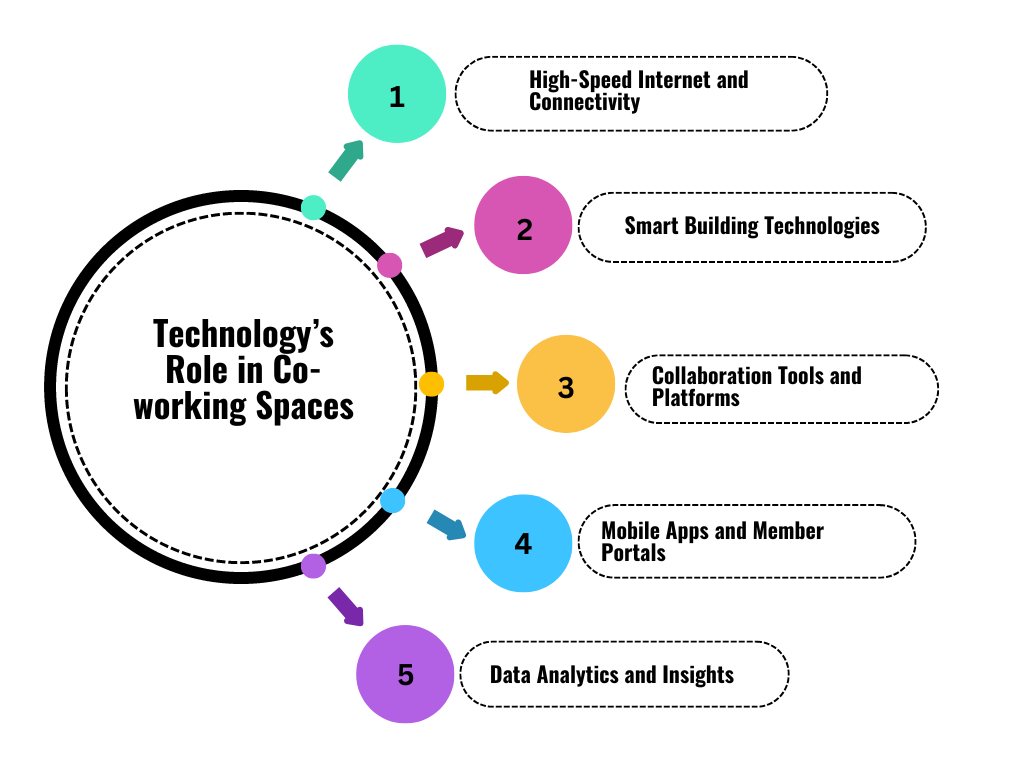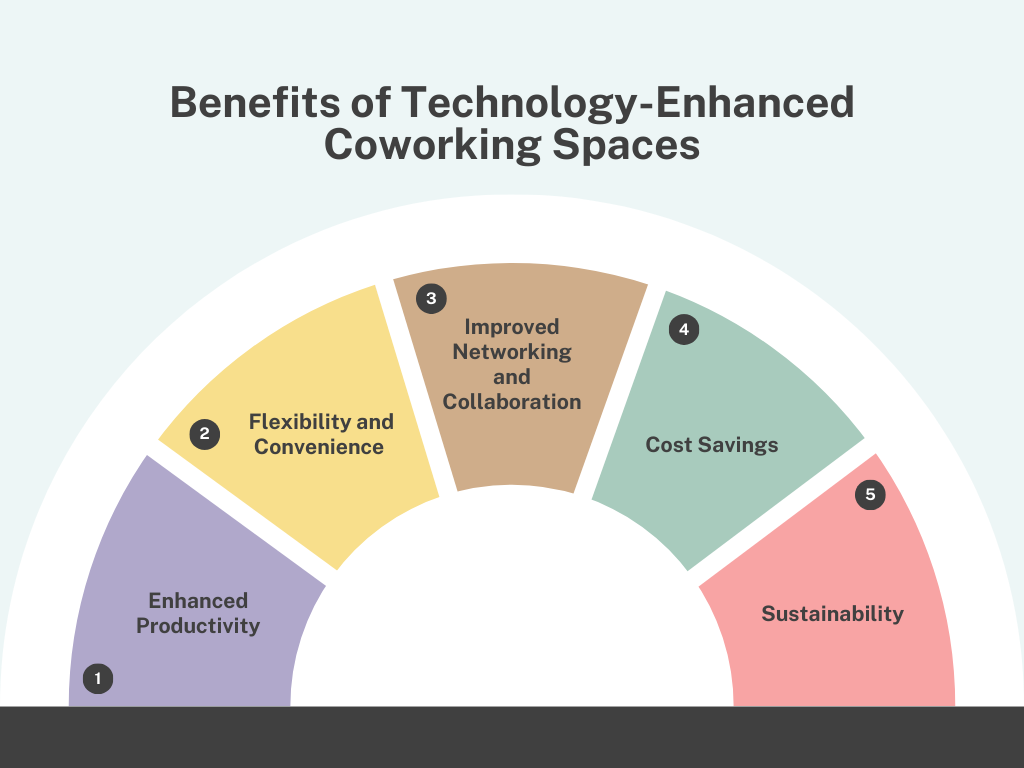The rise of coworking spaces has redefined the traditional office landscape, offering flexible and collaborative environments that cater to a diverse range of professionals and businesses. Technology plays a pivotal role in enhancing the coworking experience, making it more efficient, productive, and engaging. This blog delves into the transformative impact of technology on coworking spaces, exploring how innovative solutions are revolutionizing the modern workplace and the benefits they bring to users.
The Evolution of Coworking Spaces

Coworking spaces have evolved significantly since their inception in the early 2000s. Initially catering to freelancers and startups, these spaces have grown to accommodate businesses of all sizes, from small enterprises to large corporations. The global coworking market has expanded rapidly, driven by the demand for flexible and cost-effective office solutions.
By the early 2010s, coworking spaces began to proliferate globally, marking a significant shift in the workspace landscape. Initially popular among freelancers and independent professionals, coworking spaces quickly expanded their appeal to startups and small businesses. These spaces offered a cost-effective and flexible alternative to traditional office leases, allowing smaller companies to scale their operations without the burden of long-term contracts.
Innovation and Collaboration
Coworking spaces fostered a culture of innovation and collaboration. They became hubs where like-minded professionals could connect, share ideas, and collaborate on projects. Many coworking spaces hosted networking events, workshops, and mentorship programs, creating opportunities for personal and professional growth. This community-driven approach not only enhanced individual productivity but also spurred entrepreneurial activity and innovation.
Technological Integration
The integration of advanced technology played a crucial role in the evolution of coworking spaces. High-speed internet, cloud computing, and collaboration tools became standard features, enhancing productivity and connectivity. These technological advancements allowed members to work seamlessly and efficiently, regardless of their location. Additionally, smart building technologies, such as IoT devices for climate control and access systems, further improved the user experience by providing a comfortable and secure environment.
Corporate Adoption
In recent years, large corporations have also embraced coworking spaces as part of their workplace strategy. Companies like Microsoft and IBM have utilized these spaces to provide flexible work options for employees, foster innovation, and enter new markets. This corporate adoption has contributed to the diversification of coworking spaces, which now offer a variety of options,, including private offices, customized workspaces, and enterprise-grade amenities.
Table: Global Growth of Coworking Spaces (2010–2024)
| Year | Number of Coworking Spaces Globally | Number of Coworking Members (in millions) |
|---|---|---|
| 2010 | 600 | 0.2 |
| 2013 | 3,500 | 1.0 |
| 2016 | 11,000 | 2.1 |
| 2019 | 26,000 | 3.9 |
| 2021 | 30,000 | 5.1 |
| 2023 | 35,000 | 6.5 |
| 2024 | 38,500 | 7.2 |
The table above illustrates the significant growth of coworking spaces and membership over the past decade. This expansion reflects the increasing acceptance and popularity of coworking as a viable office solution.
Technology’s Role in Co-working Spaces
Technology has been a game-changer for coworking spaces, enhancing the functionality, efficiency, and user experience.

Here are some key ways technology is transforming coworking environments:
1. High-Speed Internet and Connectivity
Reliable high-speed internet is the backbone of any coworking space. Advanced networking solutions ensure seamless connectivity, allowing members to work efficiently without interruptions. High-speed internet enables video conferencing, cloud computing, and real-time collaboration, which are essential for modern businesses.
2. Smart Building Technologies
Smart building technologies leverage the Internet of Things (IoT) to optimize the management and operation of coworking spaces. These technologies include:
- Smart Lighting: Automated lighting systems adjust brightness based on occupancy and natural light levels, enhancing energy efficiency and creating a comfortable work environment.
- Climate Control: Smart thermostats regulate temperature based on occupancy and weather conditions, ensuring optimal comfort and reducing energy consumption.
- Access Control: Keyless entry systems using smartphones or biometric authentication enhance security and streamline access for members.
3. Collaboration Tools and Platforms
Collaboration tools and platforms facilitate communication and teamwork among coworking members. These tools include:
- Video Conferencing: Platforms like Zoom, Microsoft Teams, and Google Meet enable virtual meetings and webinars, connecting remote and onsite teams.
- Project Management Software: Tools like Trello, Asana, and Slack help teams manage projects, track progress, and communicate effectively.
- File Sharing and Cloud Storage: Services like Google Drive, Dropbox, and OneDrive allow secure file sharing and collaboration on documents in real time.
4. Mobile Apps and Member Portals
Mobile apps and member portals provide convenient access to coworking services and amenities. Features typically include:
- Booking Systems: Members can reserve desks, meeting rooms, and event spaces through mobile apps or online portals.
- Community Networking: Apps facilitate networking by allowing members to connect, collaborate, and participate in community events.
- Payments and Invoicing: Integrated payment systems streamline billing and invoicing, making financial transactions hassle-free.
5. Data Analytics and Insights
Data analytics play a crucial role in optimizing coworking spaces. By collecting and analyzing data on space usage, member preferences, and operational efficiency, coworking operators can:
- Optimize Space Utilization: Analyze occupancy patterns to maximize the use of available space and identify areas for expansion or redesign.
- Enhance Member Experience: Gather feedback and usage data to improve services, amenities, and overall member satisfaction.
- Improve Operational Efficiency: Monitor energy consumption, maintenance needs, and other operational metrics to reduce costs and enhance sustainability.
Benefits of Technology-Enhanced Coworking Spaces
The integration of technology in coworking spaces offers numerous benefits for both operators and members:

1. Enhanced Productivity
Advanced technology solutions create an environment conducive to productivity. High-speed internet, collaboration tools, and smart building technologies ensure that members can work efficiently and comfortably.
2. Flexibility and Convenience
Technology enables flexible and convenient access to coworking services. Mobile apps and member portals allow users to book spaces, manage memberships, and connect with the community from anywhere, at any time.
3. Improved Networking and Collaboration
Collaboration tools and community networking platforms foster a sense of community and facilitate professional connections. Members can easily collaborate on projects, share knowledge, and build valuable relationships.
4. Cost Savings
Smart building technologies and data analytics help coworking operators reduce operational costs by optimizing energy consumption, space utilization, and maintenance. These savings can be passed on to members through competitive pricing.
5. Sustainability
Sustainable practices are increasingly important for businesses and coworking spaces. Smart building technologies and energy-efficient systems contribute to reduced environmental impact and support corporate social responsibility initiatives.
Case Studies: Technology in Coworking Spaces
Several coworking spaces have successfully integrated technology to enhance their offerings and improve member experiences. Here are a few notable examples:
WeWork

WeWork, one of the largest coworking operators globally, leverages technology extensively to manage its spaces and provide services to members:
- WeWork App: The WeWork app allows members to book desks and meeting rooms, RSVP to events, and connect with the community.
- IoT and Smart Building Systems: WeWork uses IoT devices to monitor and control lighting, climate, and access, ensuring a comfortable and secure environment.
- Data Analytics: WeWork collects and analyzes data on space usage and member preferences to optimize operations and improve services.
Regus (IWG)
Regus, a pioneer in the coworking industry, uses technology to offer flexible workspace solutions:
- MyRegus App: The app enables members to book office space, manage their accounts, and access support services.
- Virtual Offices: Regus offers virtual office services, including mail handling and telephone answering, supported by advanced communication technologies.
- Hybrid Work Solutions: Regus provides hybrid work solutions that combine physical office space with virtual services, catering to the needs of remote and distributed teams.
Impact Hub

Impact Hub, a global network of coworking spaces focused on social impact, integrates technology to support its mission and members:
- Impact Hub Network Platform: This online platform connects members across the globe, fostering collaboration and knowledge sharing.
- Virtual Events and Webinars: Impact Hub hosts virtual events and webinars using advanced video conferencing tools, enabling members to participate from anywhere.
- Sustainable Practices: Impact Hub leverages technology to promote sustainability, including energy-efficient systems and digital tools to reduce paper usage.
Future Trends in Technology and Coworking Spaces
As technology continues to evolve, it will shape the future of coworking spaces in several key ways:

1. Artificial Intelligence (AI) and Machine Learning
AI and machine learning will enhance the functionality and efficiency of coworking spaces. Potential applications include:
- Predictive Analytics: AI can analyze data on space usage and member behavior to predict future trends and optimize space allocation.
- Personalized Experiences: Machine learning algorithms can tailor services and recommendations based on individual member preferences and usage patterns.
- Automation: AI-powered chatbots and virtual assistants can handle routine tasks, such as booking spaces and answering queries, improving efficiency and member satisfaction.
2. Virtual and Augmented Reality (VR/AR)
VR and AR technologies will transform the way coworking spaces are designed and used:
- Virtual Tours: Prospective members can take virtual tours of coworking spaces, exploring different areas and amenities from the comfort of their homes.
- AR Enhancements: AR can enhance the physical coworking environment by providing interactive information, navigation, and collaboration tools.
- Remote Collaboration: VR and AR can facilitate immersive remote collaboration, allowing teams to work together in virtual environments regardless of their physical locations.
3. Blockchain and Decentralized Networks
Blockchain technology and decentralized networks offer potential benefits for coworking spaces:
- Secure Transactions: Blockchain can provide secure and transparent payment systems, ensuring the integrity of financial transactions.
- Decentralized Platforms: Decentralized networks can support peer-to-peer services and resource sharing, enhancing the flexibility and resilience of coworking spaces.
- Digital Identity: Blockchain-based digital identity solutions can streamline access control and membership management, ensuring privacy and security.
4. Sustainable and Smart Workspaces
The focus on sustainability will drive the adoption of smart and eco-friendly technologies in coworking spaces:
- Energy Management: Advanced energy management systems will optimize energy consumption and reduce carbon footprints.
- Green Building Materials: Coworking spaces will increasingly use sustainable building materials and construction practices.
- Waste Reduction: Technology-enabled waste management systems will enhance recycling and reduce waste generation.
Conclusion
The integration of technology in coworking spaces has revolutionized the modern workplace, creating dynamic, flexible, and efficient environments that cater to the needs of diverse professionals and businesses. From high-speed internet and smart building technologies to collaboration tools and data analytics, technology enhances productivity, convenience, and sustainability in co-working spaces.To learn more about sustainability in co-working spaces, explore.
As the co-working industry continues to evolve, future trends such as AI, VR/AR, blockchain, and sustainable practices will further transform the way co-working spaces are designed and used. By embracing these innovations, co-working operators can provide exceptional experiences for their members, driving growth and success in the ever-changing landscape of the modern workplace.






